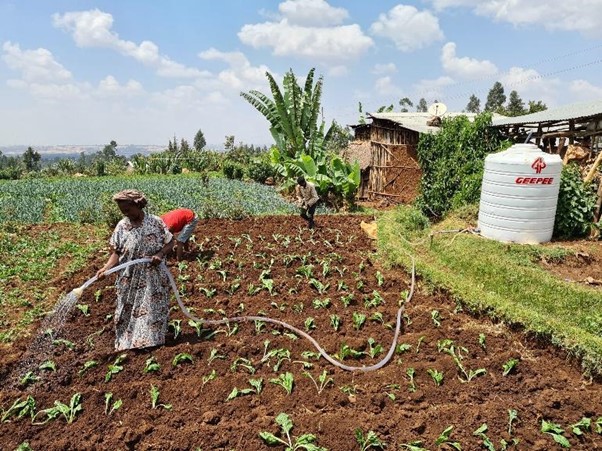Sustainable farming opportunities through solar irrigation

- Briefly tell us about UFB and the impact of your work.
United Friends Bio-Farm PLC (UFB) creates sustainable farming opportunities for smallholder farmers (SHFs) throughout Ethiopia by providing them with solar-powered pumps.
We ensure that even capital-constrained farmers can access the equipment and services they need to succeed through our flexible repayments system.
Our flexible repayments system includes cash, pay-as-you-go, and pay-as-you-grow. Pay-as-you-go is a system where the farmers are able to make incremental payments on their pumps instead of buying it outright while Pay-as-you-grow is a system where the farmers can sell us their produce at higher than market price and we deduct it from their pump cost. The produce is then packed and sold within cities.
2. United Friends Bio-Farm has an exciting future ahead. Can you give us an idea of what is in store
UFB is currently implementing its expansion plans. To make solar pumps more accessible to Smallholder Farmers (SHFs), we are collaborating with credit and savings institutions, banks, and microfinance organizations. Under this partnership, financial institutions will provide SHFs with the necessary funds.
In turn, we will supply the solar pumps, training, maintenance and the tools required for drip irrigation or biofertilizers, tailored to the specific needs of each farmer.
To further support our efforts in meeting the demand for solar-powered pump technologies, we will also be strengthening our existing collaborations with strategic partners like the AECF, who have already provided us with financing, training, and technical assistance.
By leveraging the relationship we have built with the Ministry of Agriculture, we are able to expand our reach to various parts of the country, making our products and services more accessible to those who need them the most.
Is UFB working with women in solar power irrigation? If so, what’s the impact?
We try our best to help women-owned farms by providing them with the tools they need to succeed. Although they face common farm-related issues like fuel costs, access to quality seeds and fertilizers, and adequate rainfall, the regular inherent gender bias women farmers face makes it virtually impossible for them to succeed.
We saw this come true when we met Alemitu. Alemitu is a farmer in Ethiopia who was completely dependent on seasonal rains which kept her crop production low, attributed to lack of funds to purchase a pump (either fuel or solar powered). We came in to change it all.
UFB provided the solar pump interest-free on our pay-as-you-grow basis. She had no upfront cost to the pump. Instead, we collect her produce (at a higher market price) for her to be able to pay back within three years or six harvest periods on an instalment basis. To ensure that she is able to succeed even after her payments are done, we provided her with free-of-cost on-farm professional agronomic technical support during the production period and production inputs (improved seed, pesticides, and/or fertilizers).
We have already seen an increase in her income, crop productivity and she even started selling surplus water to her neighbours.
We are very proud of what Alemitu has been able to achieve and we strive to create sustainable farming opportunities for many more women farmers in the country.
Solar-powered pumping for domestic water supply no more hand pulling/lifting from a well.
3. Thoughts on promoting irrigation technologies that are powered by renewable energy.
Although millions of Ethiopian SHFs have sufficient arable land to grow vegetables they are affected by climate change. The seasonal rains they used to rely on are now of no use to them. With a solar pump and a hand-dug well in their own backyard, however, we have seen them increase their farms’ yield irrespective of the changing weather patterns. Moreover, with solar pumps, SHFs are able to irrigate their crops throughout the year leading to additional harvest and even a chance to diversify their vegetable categories.
Another benefit to using solar-powered pumps is that farmers can shift from using fuel pumps. Other than the obvious benefits to the environment when farmers shift from fossil fuels to solar power, the farmers themselves are the primary beneficiaries. Farmers can benefit from the pumps because they don’t have to worry about ever-increasing fuel costs or traveling long distances just to fill a can of petrol anymore.
By Dawit Dejene, the Business Development Manager atUnited Friends Bio-Farm PLC







